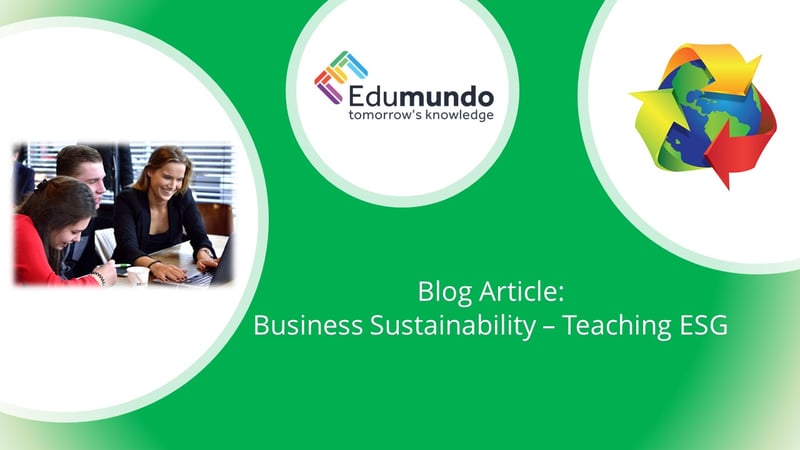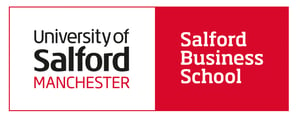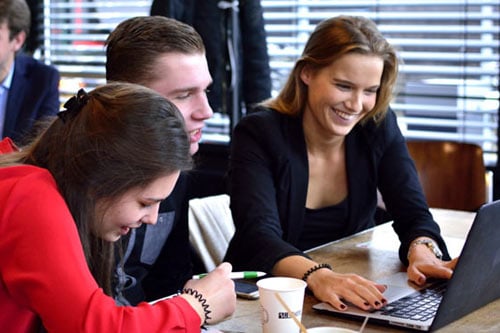"Whatever companies think they can and can't do, these are real challenges that relate to what companies do. The question is how they are able to influence the pace of transition through breakthrough and systemic innovations to meet very specific targets whilst ensuring negative trade-offs do not arise while meeting these targets."
Dr. Ziko Konwar, University of Leeds
'Sustainability' - a sustainable value
Last month leaders across the World met at the '2021 United Nations Climate Change Conference' (COP26). The topic of 'net zero' targets and broader, collaborative, and global sustainability could not have been more prominent as experts point towards this current decade as being crucial in tackling climate change.
Of course, it's not just pressures on governments but also on individuals and businesses, as well to be more aware of 'sustainability' and promote and utilise sustainable practices.
It seems apt therefore that we take a look at how the topic of 'sustainability' is being taught in business-related programmes within Higher Education. To do that effectively, we first need to understand what we mean by the term 'sustainability'.
ESG - Organisations' Global Footprints
There are three key components: Environmental, Social, and Governance (ESG) that typically are referred to when we talk of business sustainability. These are outlined below:
- Environmental - how businesses contribute to environmental sustainability. This can range from funding initiatives to tackle climate change to procuring renewable materials and reducing pollution from their manufacturing practices.
- Social - how businesses contribute to tackling social issues. These can be outreach programmes to recruit employees from under-represented groups in society, funding local community initiatives, or tackling global issues such as race and gender equality, and combatting starvation in poorer countries.
- Governance - how ethical the management of the business is. This refers to management practices, how compliant they are to tax and anti-corruption legislation, and how transparent they are in their external reporting. A good example of this can be found in companies' initiatives to tackle the 'gender pay-gap', publishing salary details and actions to reduce or remove this gap between female and male employees.
More at Stake...holder level
This emphasis on ESG sustainability has led businesses to place more importance on the needs of internal and external 'stakeholders' and not just 'shareholders'. This is commonly known as 'stakeholder capitalism' but they're not mutually exclusive.
Achieving stakeholder satisfaction will likely improve shareholders', too as the Financial Times reports that '...during the pandemic, businesses that prioritised ESG principles outperformed those that did not', so ESG initiatives are not solely expenses; for many companies they're investments.

The ongoing task at hand will be meeting the various needs of different types of stakeholders. These range from internal employees likely to be invested in the 'Governance' column of ESG; Non-Governmental Organisations (NGOs) monitoring companies' practices and initiatives largely in the 'Environmental' and 'Social' spheres; and policy-makers invested in all three, but in the current climate (excuse the pun), likely more invested in 'Environmental' outputs. Last but not least are consumers, many of whom are now more conscious of their own sustainable 'footprint' so look to purchase from businesses with a sustainable focus.
So while businesses adapt to these changes, business educators contemplate where and how the topic of 'sustainability' features in their programmes, course and module curricula.
In this article we feature contributions from Dr. Ziko Konwar, Assistant Professor in International Business from the University of Leeds, and Dr. Romas Malevicius, Lecturer in Sustainability and Ethics from Salford University to provide their insights on the importance of the topic and their approach to teaching it.
Teaching Sustainability - Ziko's and Romas' Approaches
On Ziko's MSc International Business programme, his students learn about key global issues and how they impact on business and challenges his students to address these issues.
"We have a module called 'Debates and Controversies in International Business'. This module explicitly covers topics that are focussed on ethical issues and institutional dualities which multinational enterprises (MNEs) face whilst coordinating home and host country operations, the managerial implications for international businesses, in particular how rationally bounded managers deal (and should engage) with such challenges. For example, an MNE may claim that it is pro-green and pro-human rights but if one of their subsidiaries are accused of going strongly against these values, how do corporate and subsidiary-level managers respond?"
As for Romas, with a PhD background in sustainability, he was a finalist at the 2018 Green Gown Awards (UK & Ireland) for best learning for next generation sustainability. He was also winner of the University of Salford's 2018 Vice-Chancellor’s Distinguished Teaching Awards as part of the Business Ethics and Sustainability teaching team. Since 2015 he has been teaching the level 6 'Business Ethics and Sustainability' module since.
"When I started in 2015, it was the first time I started to embed SDGs within the curriculum. And I designed the assignment based on the university as a living lab. Students select an SDG then research how the university is tackling that SDG. They are then tasked with delivering a group, Pecha Kucha style presentation - no notes, no texts, 20 seconds per slide to a group of internal stakeholders [Inclusion and Diversity, Wellbeing and Health, Environment and Sustainability staff at the university]."
Romas then saw the potential for the assignment to reach external stakeholders, too. He set-up an awards event, inviting local charities where students were awarded prizes for their presentations. The winning group of the best presentation was awarded a trophy (made from recycled materials) and a donation to their local designated charity.
Roma's module was also written-up as a case study as part of Advance HE.
Romas was also awarded a SCELT scholarship at Salford University to research students' and staff's perceptions of teaching sustainability and how sustainability has featured or could be featured within other business-related modules, as well as extra-curricular activities.
Student Motivations - Values or salaries
"Students are definitely more conscious. If we were to put this on a continuum we'd see that on one end we have students who are ethically motivated and on the other end there are students who see this [unethical practices] as just part of the game."
Whilst companies adapt to sustainable-based expectations from their customers, companies are also having to adapt to employee expectations - hitting the 'G' component of Governance knowing this will affect recruitment, retainment, and talent development of their workforce.
Within this Governance component, are we now seeing a new type of graduate job-seeker emerging? One who is more value-based in their career decisions or predominantly motivated by salary expectations.
This was Ziko's take on the matter:
"This is something we'd need to discover through post-study surveys, whether graduates are in value-based or salary-motivated positions in the years after graduating.
However, students are definitely more conscious. If we were to put this on a continuum, we'd see that on one end we have students who are ethically motivated and on the other end there are students who see this [unethical practices] as just part of the game."
Romas believes there is a wider student body more conscious of potential employers' values and practices.
"I have seen a few studies where the majority of students are now driven by opportunities at companies with more of a moral compass. I think in this new, younger generation it will be a very important factor they'll consider when looking for jobs. Many of the students I speak to seem really determined to be 'change-makers' rather than passengers in business."
Using business simulations to teach Sustainability
Another pedagogical approach employed by Ziko is to provide his students with a business simulation task, so students are tasked with managing a sustainable business entity and are awarded points for sustainable practices that improve company performance.
"We also combine our teaching with a business simulation, Phone Ventures. Here, students are tasked with sourcing sustainable produce for their smart-phones and how they market this to customer segments interested in or motivated by environmental or social or governance issues."
Students are also awarded points for integrating effective corporate sustainability initiatives in their overall business strategy:
"Carefully considering and integrating these initiatives with business strategy enables them to learn about the value of corporate sustainability to firms, and in particular what and how they could signal consumers, to build and sustain a robust company brand across borders. After completing the simulation, students are required to write an assignment on their company's performance and identify the value-enhancing (and value-inhibiting if any) effects as a result of ethical, sustainable decisions made by their company."
What does the future hold for teaching sustainability?
Ziko believes that teaching the subject needs to mirror how companies adapt or should adapt to these requirements.
"Whatever companies think they can and can't do, these are real challenges that relate to what companies do. The question is how they are able to influence the pace of transition through breakthrough and systemic innovations to meet very specific targets (for e.g. UN SDG13) whilst ensuring negative trade-offs do not arise while meeting these targets. For instance, persistence in lithium-mining for use in electric vehicles enables the transition towards greener environment (i.e. SDG13.2) but cancels the progress required to achieve climate change mitigation goals (i.e. SDG 13.1). These are the kinds of pressures companies will face. However, those that are slow in responding or unwilling to change [through incorporating value-creating sustainable practices] will become irrelevant."
Likewise, Romas sees a transition and adaptation period ahead with a focus on actual results rather than posturing.
"I think more and more universities are beginning to understand that students want to be equipped with knowledge linked with sustainability. It's not just the job of an environmental and sustainability department. It also shouldn't be featured in every single module, but be prevalent in extra-curricular activities instead of just formal curricula. There are challenges given a crowded curriculum and knowledge-gaps on the topic across various subjects. However, institutions are adapting and many are addressing this, more action and less box-ticking."
So now sustainability is more sustainable it remains to be seen how Higher Education will adapt and integrate the topic within its broader curricula.
However, one constant remains: education will need to accurately reflect but also inform industry practices so plenty of opportunity for good examples to be set and sustained - 'greenwashing', 'whitewashing', and 'bluewashing' may now be a thing of the past.
Enjoyed reading this blog article?
Sign-up to our newsletter to be notified of future articles and webinars - we'll also be hosting a webinar on business sustainability in the new year.
References
- Financial Times "Embedding Sustainability Into Business Education" [Accessed on: 01/11/2021]; [Accessed from: https://www.aacsb.edu/insights/2021/february/embedding-sustainability-into-business-education]
- Alva Group "ESG and corporate stakeholders" [Accessed on: 02/11/2021] [Accessed from: https://www.alva-group.com/blog/esg-and-corporate-stakeholders]


.png?length=300&name=unnamed%20(11).png)
.png?length=300&name=unnamed%20(7).png)
.png?length=300&name=unnamed%20(8).png)
.png?length=300&name=unnamed%20(6).png)

.png?length=300&name=unnamed%20(10).png)
.png?length=300&name=unnamed%20(5).png)
.png?length=300&name=unnamed%20(9).png)
.png?length=300&name=unnamed%20(4).png)
.png?length=300&name=unnamed%20(2).png)
.png?length=300&name=unnamed%20(1).png)
.png?length=300&name=unnamed%20(3).png)
.jpg?length=300&name=unnamed%20(2).jpg)





.png?length=300&name=loughborough-university-logo%20(small).png)





